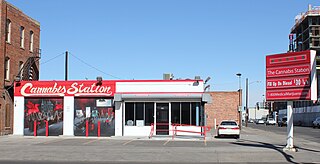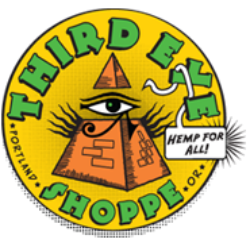
420, 4:20 or 4/20 is cannabis culture slang for marijuana and hashish consumption, especially smoking around the time 4:20 p.m. (16:20). It also refers to cannabis-oriented celebrations that take place annually on April 20.
Hash Bash is an annual cannabis event held on the University of Michigan campus in Ann Arbor, Michigan, featuring a series of speeches and live performances focus on the goal of legalizing marijuana at the federal, state, and local levels in the United States.

Cannabis in Oregon is legal for both medical and recreational use. In recent decades, the U.S. state of Oregon has had a number of legislative, legal and cultural events surrounding the use of cannabis. Oregon was the first state to decriminalize the possession of small amounts of cannabis and authorize its use for medical purposes. An attempt to recriminalize the possession of small amounts of cannabis was turned down by Oregon voters in 1997.

In the United States, cannabis is legal in 39 of 50 states for medical use and 24 states for recreational use. At the federal level, cannabis is classified as a Schedule I drug under the Controlled Substances Act, determined to have a high potential for abuse and no accepted medical use, prohibiting its use for any purpose. Despite this prohibition, federal law is generally not enforced against the possession, cultivation, or intrastate distribution of cannabis in states where such activity has been legalized. Beginning in 2024, the Drug Enforcement Administration has initiated a review to potentially move cannabis to the less-restrictive Schedule III.

The legal history of cannabis in the United States began with state-level prohibition in the early 20th century, with the first major federal limitations occurring in 1937. Starting with Oregon in 1973, individual states began to liberalize cannabis laws through decriminalization. In 1996, California became the first state to legalize medical cannabis, sparking a trend that spread to a majority of states by 2016. In 2012, Washington and Colorado became the first states to legalize cannabis for recreational use.

Cannabis in Massachusetts is legal for medical and recreational use. It also relates to the legal and cultural events surrounding the use of cannabis. A century after becoming the first U.S. state to criminalize recreational cannabis, Massachusetts voters elected to legalize it in 2016.

Oregon Ballot Measure 91 was a 2014 ballot measure in the U.S. state of Oregon. Its passage legalized the "recreational use of marijuana, based on regulation and taxation to be determined by the Oregon Liquor Control Commission".

The "Burnside Burn" was an event held on the Burnside Bridge in Portland, Oregon, starting at midnight on July 1, 2015, the day recreational marijuana became legal in the U.S. state of Oregon. It was organized by Portland NORML, the local chapter of the National Organization for the Reform of Marijuana Laws, having originated from its executive director, who wanted to photograph himself in front of the White Stag sign in the moments after Oregon Ballot Measure 91 took effect. The crowd, larger than anticipated, numbered in the thousands and at times blocked traffic lanes on the bridge. Some attendees wanted to commemorate the moment, while others were motivated by announcements of free marijuana and seeds. No fines were issued for consumption in public. The event was covered by cannabis publications, local and national news outlets, and the HBO television series Vice.

Paul Stanford is the founder of The Hemp and Cannabis Foundation (THCF), THCF Medical Clinics, and the Campaign for the Restoration and Regulation of Hemp (CRRH).

Cannabis dispensaries in the United States or marijuana dispensaries are a type of cannabis retail outlet, local government-regulated physical location, typically inside a retail storefront or office building, in which a person can purchase cannabis and cannabis-related items for medical or recreational use.

Cannabis is legal in Illinois for both medical and recreational use. Illinois became the eleventh state in the US to legalize recreational marijuana effective January 1, 2020.

Cannabis in New Jersey is legal for both medical use and recreational use. An amendment to the state constitution legalizing cannabis became effective on January 1, 2021, and enabling legislation and related bills were signed into law by governor Phil Murphy on February 22, 2021.

Cannabis in Washington relates to a number of legislative, legal, and cultural events surrounding the use of cannabis. On December 6, 2012, Washington became the first U.S. state to legalize recreational use of marijuana and the first to allow recreational marijuana sales, alongside Colorado. The state had previously legalized medical marijuana in 1998. Under state law, cannabis is legal for medical purposes and for any purpose by adults over 21.

In Washington, D.C., cannabis is legal for both medical use and recreational use for possession, personal use, cultivation, transportation and gifting, and for retail sale once a regulatory system is implemented following an affirmative vote by the residents on a 2014 ballot initiative. The United States Congress exercises oversight over the government of the District of Columbia, preventing the local government from regulating cannabis sales like other jurisdictions with authority derived from a U.S. state.
The first Donald Trump administration (2017–2021) took positions against marijuana and against the easing of laws regarding marijuana. Although Trump indicated during his 2016 presidential campaign that he favored leaving the issue of legalization of marijuana to the states, his administration subsequently upheld the federal prohibition of cannabis, and Trump's 2021 fiscal budget proposal included removing protections for state medical marijuana laws.

Third Eye Shoppe, commonly known as The Third Eye, was a head shop in Portland, Oregon's Hawthorne district and Richmond neighborhood, in the United States. The shop was founded in 1987 and owned by cannabis and counterculture activist Jack Herer. His son, Mark Herer, took over as the shop's owner in 2001. The Third Eye closed on March 31, 2017, as a result of declining sales, development of the surrounding neighborhood, increasing health care costs, and increased competition. For nearly thirty years, the shop was associated with Portland's cannabis culture and recreational drug tourism, and was included in Willamette Week's annual "Best of Portland" reader's poll several times.

Portland NORML is the National Organization for the Reform of Marijuana Laws (NORML) affiliate for Portland, Oregon, in the United States. The chapter was established in January 2015 by Portland-based radio host and cannabis activist Russ Belville. Scott Gordon serves as its executive director.
Women have been active in the cannabis industry, cannabis legalization, cannabis testing, and cannabis rights since the earliest days of commercialization, but they have also faced gendered obstacles impeding their growth in an industry worth over 12 million dollars since 2019. "The American cannabis industry accounted for $10 billion of 2018’s [global] figures, with the average U.S. dispensary pulling in $3 million a year."

A budtender is a title of a staff member who works within a dispensary or store where medical or recreational cannabis is sold. Their job is to offer suggestions to customers, answer questions, handle products and showcase products being sold.















